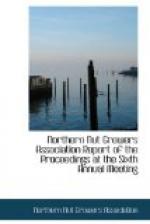In regard to setting out trees along the highways, that is a beautiful idea theoretically. I happen to see one of my neighbors in Connecticut here in the audience. He remembers when I tried to be public-spirited and set out a number of fruit trees around the borders of my place, in order that the passerby might have some fruit. What happened was that not only the passerby wanted fruit, but he wanted it early, and he brought others from a distance who wanted fruit. They broke down the trees, and also entered my premises and carried off my private supply having been attracted by my roadside bait. I wanted to beautify the highway for a mile and set out 3,000 pine trees. After they had grown to look pretty, people came in automobiles and carried them off. These people could not think of helping to set out roadside trees but when someone else had done it they came and lugged off the trees.
So long as we are in a semi-civilized state, we cannot talk about beautifying our roads, as does Germany. Germany has set an example of efficiency for the entire world, no matter what your opinion may be as to the present conflict. At the present time she is perhaps believing that she is carrying on a utility crusade. One of the German methods is to line the roadways with fruit-bearing trees, including nut trees, in such a way that the income pays the taxes for some villages. But they are under government control.
MR. POMEROY: Dr. Morris’s suggestion is very good in regard to marking seedlings. Of course his office is in New York City, though his farm is in Connecticut and New York has a law which fills the bill. A customer can get a complete history of the tree from his nurseryman. If from a barren tree, he must so state. I think this state is about the only state that has such a law.
One other thing. The first big battle fought between the Germans and the Belgians was on a highway along ten miles of which stood Persian walnut trees, and I have often wondered how much damage was done to the trees.
THE PRESIDENT: I will ask the secretary to read the motion Dr. Morris incorporated in his talk.
THE SECRETARY: “No ungrafted nut tree of any sort shall be sent out under a name for propagation purposes except with the statement that it is a seedling.”
MR. LITTLEPAGE: That is a matter which I imagine will come before the executive committee, and I would suggest that it be left in their hands and worked out by them. With Dr. Morris’s consent I would refer this to that committee.
MR. POMEROY: Just because a tree has been grafted, why is all this necessary? The nurseryman is bound to tell from what it is taken. That is covered by the law. He need not be even a buyer, merely a prospective buyer. What I want to bring out is this. Suppose a nurseryman here in this state sells a tree,—he must have a permit before he can do it; he cannot send even a twig through the post office otherwise. I don’t see if a bud is taken from a tree and put on a black walnut tree that it necessarily makes the bud that grows on the black walnut tree any better than the parent.




